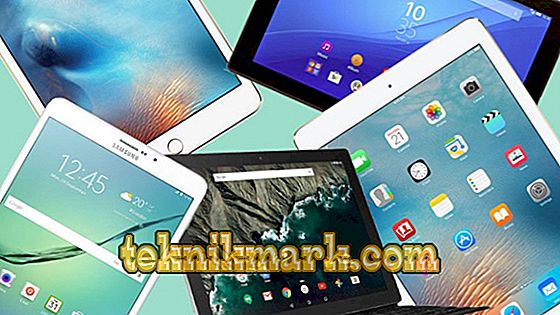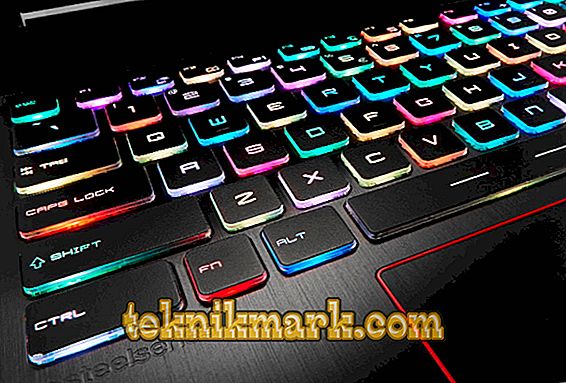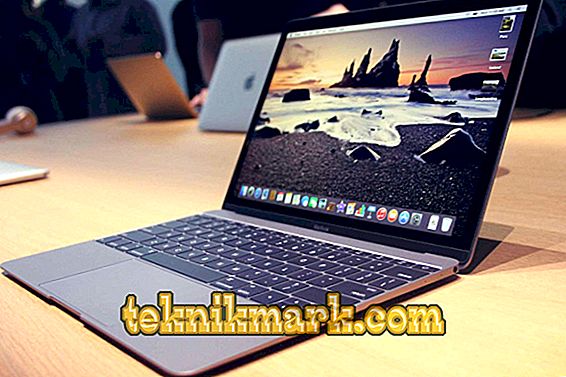Modern technologies dictate their own rules, sending outdated devices into oblivion and expanding the electronics market with innovative devices. At the same time, the demand for many technical devices that are at the peak of popularity in the early 2000s does not allow them to be supplanted, despite the appearance of more advanced counterparts. For long-lived, which are still relevant today, include laptops. They have greatly evolved over the decades of their existence, but at the moment there is a lot of competition for them tablets that combine the functions of a laptop and a smartphone, thus offering many opportunities with their compact dimensions. Mobility and high performance - the main parameters that determine the choice of the device today.

Right choice: tablet or laptop?
Both a tablet and a laptop can have good performance, but the differences in the capabilities of devices still exist, starting with external data, ending with software, and under certain conditions between them is just a huge difference. Every year, manufacturers of modern devices strive to make them as wide-ranging as possible, equipping them with new features, and at the same time, the smaller the overall package that contains the power of high-tech hardware, the better.
A tablet and a laptop are fundamentally different devices and cannot be put on the same shelf, the choice largely depends on the intended purpose in each particular case. In a good way, a modern user has several devices in the arsenal assigned for different tasks at once, but if the budget is limited and only one of the devices is planned to be purchased, users are often puzzled by the question of what to buy. To determine the choice, you should consider the benefits of using each of the devices and determine the purpose of the purchase.
The tablet is better than a laptop
The tablet at this stage of its evolution cannot yet be assigned the status of a full-fledged portable computer, despite decent “stuffing” in a number of models, but when asked if the tablet can replace a laptop, the answer will differ depending on what tasks the device is planned to be used for. So, for some users, it is really compact, but a functional device can become an excellent alternative to a computer if all user requirements for the device are met. Positive sides of the tablet:
- Mobility. Modern tablets can have a fairly powerful "stuffing", while enclosed in a slim case. Due to the compactness and lightness of the devices, you can almost always carry them with you, whereas in the case of a laptop you will have to get a bag for transporting the device, which, moreover, is usually about two kilograms or more. One more thing, what a tablet compares favorably with a laptop is a longer battery life.
- The quality of the screen. In modern tablets (meaning devices of the average price category and premium class) displays are used with the quality level of smartphone screens, which significantly differ from the matrixes of laptop monitors for the better. In this case, the tablet price tag can be two times lower than the cost of the laptop.
- Built-in cameras. Typically, tablets, by analogy with smartphones, are equipped with two cameras - the main and the front one, which allows you to take pictures and video footage. Of course, the quality depends on the level of equipment, but most often the tablet at the average price shoots pretty well, while the laptop camera is suitable only for video calls using applications like Skype.

- Quick access and speed. Tablets have a high on / off speed, and from sleep mode they exit instantly at the touch of a button, which provides quick access to device functionality. By controlling through the touch screen with your fingers or a stylus, you can perform various actions much faster, and mobile operating systems show better performance.
- Operating Systems. For tablets used mobile systems, most often, such as Android, iOS. They are distinguished by high-quality assembly, if we are talking about official products, and their capabilities can be significantly expanded through utilities from app stores. Windows on tablets can be found much less often. Management of mobile OSes is performed through the touch screen.
- Reliability of applications. Downloading programs and games from the official app store (Google Play, App Store, Microsoft Store) to a mobile device, you can not worry about viruses, as is the case with downloading software from various resources (sometimes very doubtful) from the Internet. The procedure for installing and uninstalling software is simple. On a laptop, to download or remove some software, you need to try, and improper deletion can lead to conflicts and failures.
- Structural stability to damage. Of course, to say that the tablet is not at all subject to mechanical damage, it is impossible, but in comparison with a laptop in this parameter, it wins. A tablet usually crashes or falls normally, and for a laptop such tests can be fatal.
- Replacing multiple devices. The tablet is very convenient to read, so it can easily replace the e-book. Also, if necessary, the device will be able to work as a digital frame.
- GPS Navigator. The tablets are often implemented GPS module, through which the device can be used as a navigator. With 3G support, it is convenient to download maps from the network.
- Cost Most often, a tablet computer will be cheaper for the price than a laptop. In this case, it all depends on the brand, model and equipment.

The tablet is superior in some parameters, but in others it is still inferior to a laptop. So, for many users, the key element of the device is the keyboard. Sensory can and is suitable for certain tasks, but not for all, especially when it comes to professional activities related to the active use of the input device. Today, to please those who are puzzled that it is better to buy a laptop or tablet with a keyboard, transforming tablets have appeared on the market, which are already more competitive in this regard than ordinary tablets. Thanks to the rapidly developing technologies, the boundaries between the laptop and the tablet are becoming increasingly blurred, but despite the strong position in the electronics market, it’s still early to say that the tablet can easily replace the laptop.
How is a laptop better than a tablet?
Continuing the topic, we now consider in more detail why the tablet cannot become a full-fledged replacement for a laptop. The advantages of the laptop are the following qualities:
- Screen diagonal. This parameter is often no less important than the power of the device. In laptops, the display diagonal reaches 19 cm, whereas tablets usually have screens up to 10 cm in diagonal, there are more, but the cost of such devices will be much higher. For most tasks, it is more convenient to use a device with a large screen. So, a laptop may well replace a stationary computer, but the tablet on this point is clearly losing.
- Information input devices (keyboard, mouse, touchpad). The laptop is much more equipped than the tablet and difficult to argue with that. Among the main advantages - the presence of a full keyboard, which can not be said about devices with a touch screen. Yes, you can purchase a tablet and connect a keyboard to it, but this solution will be successful only in some cases. A person who works at a computer with an insufficiently miniature keyboard is often very uncomfortable, and you have to type in many areas of activity. In addition, the disadvantage of using a separate input device is the inability to adjust the angle of the screen, which is very important when working. Another important input device is the mouse. Using a touchpad, a panel that serves as a mouse in laptops is not always convenient, but additionally connecting to a laptop is no problem. You can't say the same about the tablet, so their owners have to do without a mouse, control the device with their fingers and stylus, and type the text with their voice or using the virtual keyboard. Thus, it is better to work with serious programs, editors and other software on a laptop, whereas for internet communication, some games and similar hanging out on the net, a tablet is also suitable.

- A wide range of tasks. This is one of those main characteristics that makes tablets seriously different from laptops. Technical equipment portable device involves the implementation of almost any action. According to the complexity of the tasks performed on modern models, laptops correspond to the capabilities of stationary PCs and are suitable for professional activities in various fields, in this respect the difference between a tablet and a laptop is huge. Even if you perform some time-consuming tasks for a mobile device under the force, time costs will be inappropriate. Another feature inherent in laptops is burning discs. Not every user needs this, but many need it.
- The amount of internal memory device. Whichever disk is installed on a laptop, hard or SSD, they offer much more space than the internal memory of tablets. Despite the possibility of storing large amounts of information in the cloud, this option is not suitable for everyone.
- Ability to connect external devices. Thanks to the numerous connectivity interfaces and compatibility of the laptop with various devices, you can connect a printer, scanner, MFP, speaker system, monitor, TV and other equipment to the device. Some tablets also provide this opportunity, but they also interact with a limited range of devices, and that, provided that there is Wi-fi in the connected object or using adapters. A laptop does not require any “crutches” to perform such simple tasks without complications.
- Using a flash drive. As for USB ports, they are implemented on laptops in sufficient quantity, while tablets are deprived of this opportunity, only some of them can support interaction with flash drives, and then using an OTG cable.
- Operating Systems. The performance and functionality of the operating system for laptops is implemented at a high level. Devices work on operating systems Windows, Linux and MacOS. The functionality of the computer OS will be much wider, besides, it is easier for users to work in a familiar environment.

- Software. The software for popular operating systems, in particular Windows, has been developed a lot, so you can easily find programs for any tasks on the Internet. Mobile OS is much younger, so the range of applications for them is not so great, also often the versions of mobile software are not entirely adapted, and using the programs originally developed for computers on the tablet is not very convenient. In addition, the weighty professional software with advanced functionality is very demanding and not available for mobile devices.
What to choose a tablet or laptop
Selecting a device, knowing its capabilities, should be uniquely based on their own needs. So, having determined the purpose of the purchase, you will immediately receive an answer to the question what is better to buy, a tablet or a laptop. Depending on the tasks performed, this or that device may be perfect. Despite the fact that tablets are more modern devices, it’s too early to discount laptops. This is ideal for home, because the laptop can easily replace a desktop computer, and if necessary it can be taken with you, because it is still a portable PC and is not tied to a place like a computer. It is much more convenient to work on a device with large hardware and a computer operating system, many professional programs are supported only by such operating systems and consume a lot of resources.
In some cases, you need to have a very powerful laptop or computer for work, so even a mid-level device, not to mention a tablet that is not intended for such use, will not work. The same can be said about choosing a device for a gamer, adherents of computer games are unlikely to be content with tablet capabilities, although the latest models of devices are impressive in their characteristics and for some of them quite decent game software of console level is available. In some cases, a tablet can be enough for a student or a schoolchild, but more often the study is comparable to the same work, where you need to print a lot, work in various programs, etc., therefore a laptop is better suited here.
For people who are not thinking of life without the Internet, social networks and other time killing - the best solution would be to buy a tablet. It is also the best option for children of preschool age and lower grades, as well as for the elderly. As a rule, a pensioner is an even less advanced user than a child (of course, there are exceptions), but there is often a need to purchase a device, for example, for video calls with relatives. To use Skype, Viber and other instant messengers tablet is enough. At the same time, older people who once mastered a PC on Windows 95, by contrast, may not make friends with a touch device. The picture will be the same as with smartphones, because retirees prefer push-button "grandmothers" not because of their democratic value.
So, a clear answer is that it will not be better to purchase a tablet or laptop, since this is a matter of an individual nature. Of course, it is ideal to have several devices for any tasks, but the possibilities often force people to choose. A good alternative today is to buy a 2in1 hybrid device, which can work both as a tablet and as a laptop.



